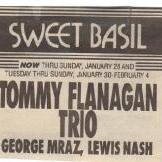-
Posts
1,641 -
Joined
-
Last visited
-
Donations
0.00 USD
Neal Pomea's Achievements
Newbie (1/14)
Recent Badges
About Me
Neal Pomea (Pommier)
610 Eldrid Drive
Silver Spring, MD 20904
npomea@gmail.com
My favorite post-jazz music is bebop. In the last few years, through a friendship with collector Joe Bussard, I have been learning and loving the jazz of the 1920s and early 1930s.
I am originally from southwest Louisiana and of Cajun descent on both my mother and father's side of the family. My parents and whole community were primarily French speaking, and even my older brother's first language was Cajun French, but by the time I came along in the mid 1950s it was the fashion to make damn sure the kids knew English when they started school. The prejudice against French speaking children in school was tremendous, traumatic, and maybe the death knell for a proud culture that had remained true to its roots despite the odds.
I do what I can to help preserve our language and culture. Cajun French activists in the late 1960s like Paul Tate, Dewey Balfa, and Revon Reed of Mamou made a conscious effort to use our Cajun music to help promote pride in our heritage and perhaps preserve it. A new generation of activists and musicians took up the cause -- activists and educators like Barry Ancelet at the University of Southwestern Louisiana, Richard Guidry with the Louisiana Dept. of Education, Michael Doucet of the band Beausoleil, Zachary Richard and many others. I knew these people when the Cajun Renaissance was getting underway.
I have since moved away to Maryland for economic reasons and stayed here to marry, but I have been involved in Cajun culture preservation in my own way for quite a while. I have a Web site featuring orphaned, abandoned Cajun music from the late 1940s to the 1960s. I hear from many people that it is the missing link, the stuff that fills in the black hole in the knowledge of our youngest generation of Cajun musicians. They could hear recordings from the 1920s and 30s thanks to European reissue labels, and recordings from the 1970s to the present because they still have some kind of monetary value and are available on labels like Swallow, Arhoolie, Rounder, La Louisianne and a few others. But the music of the 40s through the 60s was all but abandoned. Ignorance of it in Louisiana represented a real loss of cultural memory.
I have come to a sort of truce with these people who, because of our copyright laws and a general disdain in the United States for the public domain, still unbelievably hold a monopoly on our cultural treasures. Some of the copyright holders who had windfalls from copyright term extension have even applauded me for my preservation work and for restoring awareness about long forgotten great musicians and their wonderful art. Well, at least that's something. If only these artists had been paid royalties all along in the first place.
See http://npmusic.org.
_forumlogo.png.a607ef20a6e0c299ab2aa6443aa1f32e.png)



